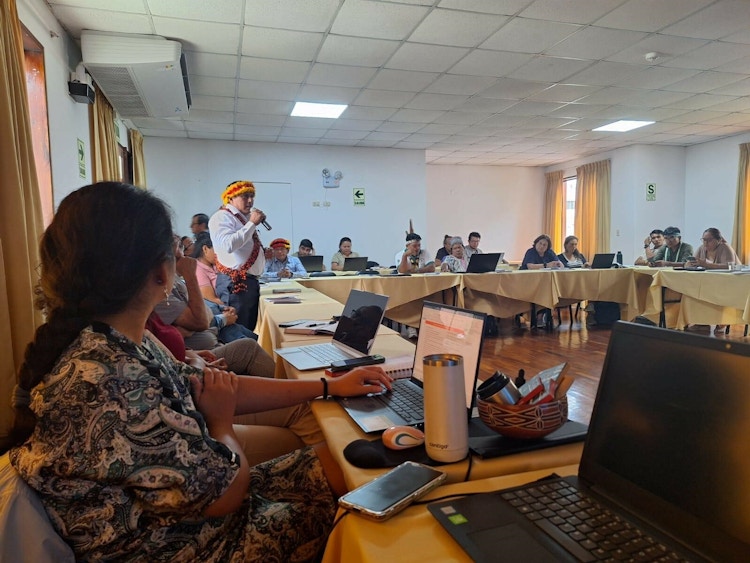Peru:
New “anti-NGO law” puts vulnerable communities at risk
The law denies victims of human rights violations access to justice. An attempt to silence critics, says civil society organisations.

PROTEST: Indigenous people protest at the COP20 summit in Lima, Peru, 2014. Photo: Ronny Hansen/Rainforest Foundation Norway
By Rainforest Foundation Norway.
On March 12, Peru’s Congress passed controversial amendments to a law governing the Peruvian Agency for International Cooperation (APCI). In mid-April, Peru’s president, Dina Boularte, approved the amendments, significantly reducing civic space and increasing state control over independent organizations. Civil society fears that democratic space will be considerably restricted.
"This law seeks to ensure that the state is not subject to oversight, criticism, or prosecution. And when the state violates fundamental collective rights, this law would prevent us from denouncing them. This is very serious", says Jorge Perez, president of AIDESEP, an organization representing regional Indigenous organizations of the Peruvian Amazon.

PARTNER: Jorge Perez, president of AIDESEP, one of Rainforest Foundation Norway's partner organizations in Peru.
Peru's president ignored push to veto bill
When amended, the law will require all civil society programs to gain prior approval from the Peruvian Agency for International Cooperation (APCI) and impose severe penalties for noncompliance. It will also grant APCI broad discretion over resource use and prohibit NGOs from taking legal action against the state while requiring media outlets and investigative organizations to obtain prior approval from APCI before publishing reports, violating the right to freedom of expression.
The bill's passage has drawn criticism from national and international actors, who have been urging President Dina Boluarte to veto the amendments. The concerns center on the law’s potential to undermine democracy by limiting civil and political rights and denying victims of human rights abuses access to justice. After Boularte’s public signature of the law last week, the law is on track to be regulated and implemented.
"This law is a major setback for Peru's civil society and environmental protection. Restricting Indigenous and NGO operations and international cooperation threatens Indigenous Peoples’ rights, rainforest conservation, and fundamental democratic principles", says Mayu Velasco Anderson, head of Rainforest Foundation Norway’s Peru and Colombia program.

ANTI-NGO LAW: Indigenous organizations and civil society partners discuss the consequences of the Anti-NGO law at a Rainforest Foundation partner meeting in March 2025
Civil society protests proposed amendments
Civil society organizations are actively protesting the amendments.
The Institute for Legal Defense (IDL), a Peruvian partner to Rainforest Foundation Norway, has issued a statement declaring the new APCI law unconstitutional, violating Article 139 of the Peruvian Constitution, which guarantees everyone’s right to access justice, and an attempt to silence civil society.
"This is not about transparency or oversight but rather retaliation against those who, for decades, have litigated in defense of victims of abuse of power, corruption, and violations of fundamental rights", said IDL shortly after the adoption in Congress.
Indigenous organizations have also spoken out about the issue, highlighting that it violates Article 89 of the Constitution, which recognizes that community property is imperceptible and collective, as well as international standards on the rights of Indigenous peoples. Although the president has approved the law, many still call for the decision to be reversed.
"We urge Peruvian authorities to reconsider and engage with civil society to uphold fundamental human rights and environmental commitments", concludes Velasco Anderson.

Mayu Velasco Anderson
Head of the Peru and Colombia Programme
mayu@rainforest.no